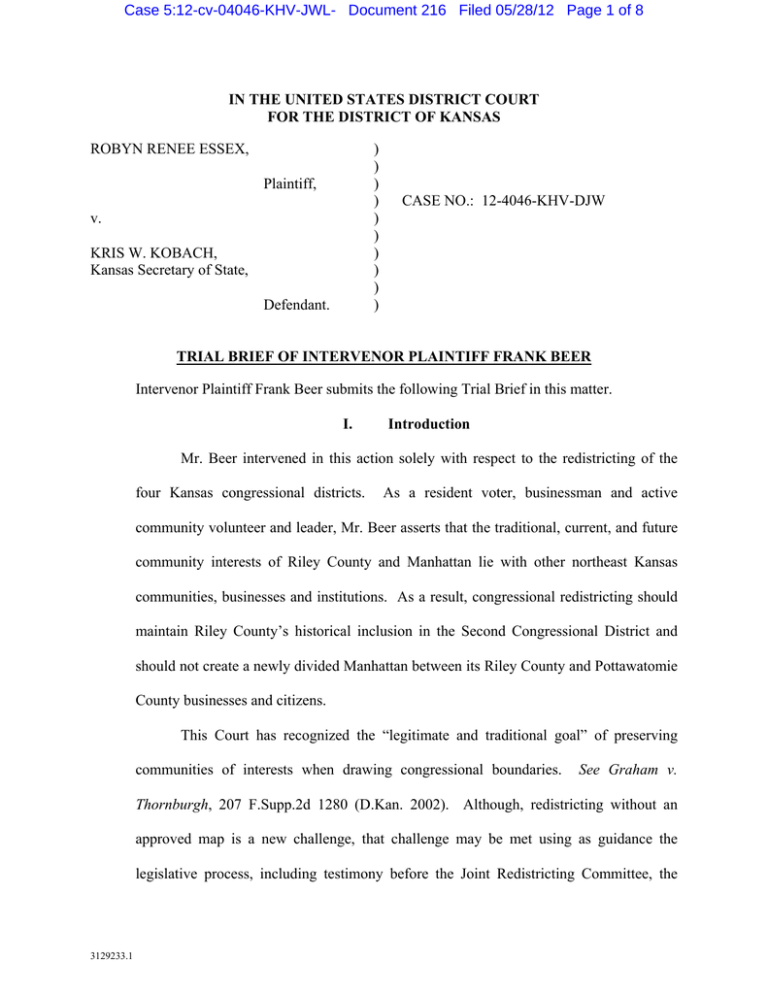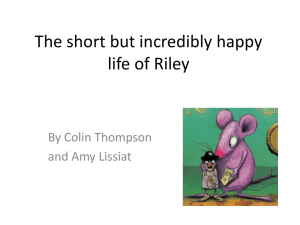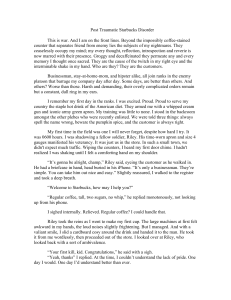ROBYN RENEE ESSEX, ) Plaintiff,
advertisement

Case 5:12-cv-04046-KHV-JWL- Document 216 Filed 05/28/12 Page 1 of 8 IN THE UNITED STATES DISTRICT COURT FOR THE DISTRICT OF KANSAS ROBYN RENEE ESSEX, ) ) ) ) ) ) ) ) ) ) Plaintiff, v. KRIS W. KOBACH, Kansas Secretary of State, Defendant. CASE NO.: 12-4046-KHV-DJW TRIAL BRIEF OF INTERVENOR PLAINTIFF FRANK BEER Intervenor Plaintiff Frank Beer submits the following Trial Brief in this matter. I. Introduction Mr. Beer intervened in this action solely with respect to the redistricting of the four Kansas congressional districts. As a resident voter, businessman and active community volunteer and leader, Mr. Beer asserts that the traditional, current, and future community interests of Riley County and Manhattan lie with other northeast Kansas communities, businesses and institutions. As a result, congressional redistricting should maintain Riley County’s historical inclusion in the Second Congressional District and should not create a newly divided Manhattan between its Riley County and Pottawatomie County businesses and citizens. This Court has recognized the “legitimate and traditional goal” of preserving communities of interests when drawing congressional boundaries. See Graham v. Thornburgh, 207 F.Supp.2d 1280 (D.Kan. 2002). Although, redistricting without an approved map is a new challenge, that challenge may be met using as guidance the legislative process, including testimony before the Joint Redistricting Committee, the 3129233.1 Case 5:12-cv-04046-KHV-JWL- Document 216 Filed 05/28/12 Page 2 of 8 Senate Committee on Reapportionment, and the House Redistricting Committee, along with an understanding of the economic, educational, military, research and development connections between Riley County and its northeastern Kansas neighbors. II. 1. Summary Statement of Facts1 The Manhattan Chamber of Commerce represents nearly 900 companies ranging from sole proprietorships to large businesses, philanthropic organizations and governmental institutions. Beer Declaration at ¶ 5. 2. In 2011, a broad-based Task Force of the Chamber conducted a thorough and comprehensive review of the issues relating to congressional redistricting. Id. at ¶¶ 6-8. 3. The consensus of the Manhattan and Riley County participants was that economic development forces, sources of capital, jobs and growth, demographic trends, research and educational opportunities, and the historical, current and future connections between Manhattan and Riley County with other eastern Kansas communities persuasively required the continuation of Riley County as part of the Second Congressional District. Id. at ¶ 8. 4. Testimony regarding this conclusion and the reasons behind it was provided to the Joint Redistricting Committee on July 27, 2011 and September 30, 2011, to the Senate Committee on Reapportionment on January 13, 2012, and to the House Redistricting Committee on March 5, 2012. See Trial Exs. 203-206. 1 The facts set forth here are supported by in the unopposed Declarations of Intervenor Plaintiff Frank Reitz (Docket No. 202-1) and Bruce Snead (Docket No. 203-1) and Trial Exhibits 200-214. 3129233.1 2 Case 5:12-cv-04046-KHV-JWL- Document 216 Filed 05/28/12 Page 3 of 8 5. The Chamber presented two separate, non-ranked redistricting plans to the Legislature. See Trial Exs. 210-211. 6. The Manhattan City Commission and the Riley County Commission each adopted resolutions declaring it appropriate public policy to maintain Manhattan and Riley County as a unified community within the Second Congressional District. See Trial Exs. 207-208. 7. Many connections and collaborative efforts link Riley County to the I-70 Corridor to the east and to communities in northeast Kansas. Among the most important are the National Bio and Agro-Defense Faility (“NBAF”), the Animal Health Corridor, the Kansas Research Nexus, and the cooperative efforts of military installations at Ft. Riley and Ft. Leavenworth. Id. at ¶¶ 17-21; Snead Declaration at ¶¶ 8-12. 8. The Animal Health Corridor is an extensive effort linking Riley County as its western anchor and reaching east through Topeka, Lawrence, and Johnson County into Missouri. The Animal Health Corridor seeks to connect private sector businesses, governmental entities, veterinary colleges, and research institutions within the corridor to promote economic development. The primary focus of the Animal Health Corridor looks to the east from Riley County and Kansas State University. See Trial Ex. 211. 9. The NBAF project represents an unprecedented cooperative effort of local, regional and state government, Ft. Riley and Ft. Leavenworth, private businesses and governmental organizations, which together led to the selection of Kansas for this multibillion dollar homeland security project. NBAF is complementary to the Animal Health Corridor and connects Riley County to bio-science interests, businesses and homeland 3129233.1 3 Case 5:12-cv-04046-KHV-JWL- Document 216 Filed 05/28/12 Page 4 of 8 security participants stretching throughout the I-70 Corridor to Ft. Leavenworth. See Trial Ex. 212. 10. As a result of a comprehensive analysis of shared and complementary assets among Manhattan, Topeka and Lawrence, starting in 2010, these three communities created The Kansas Research Nexus. The Nexus intentionally and expressly builds on the similar interests, demographics, growth and urban development of Manhattan, Topeka and Lawrence. See Trial Exs. 213-214. 11. The community of Manhattan spans two separate counties, Riley County and Pottawatomie County. Much of the recent growth of commercial and industrial based for Manhattan has occurred to the east, in Pottawatomie County. Beer Declaration at ¶ 16; Snead Declaration at ¶ 7. 12. The overwhelming majority of draft maps presented to the Legislature recognized the necessity of maintaining Riley County in the Second Congressional District and the numerous options for creating constitutionally permissible districts to meet that public policy goal. See Joint Stipulation of Fact at ¶¶ 49, 50, 51, 52, 53, 54, 55, 57, 58, 59. III. Argument and Authorities The goal of redistricting following a decennial census is more easily stated than accomplished. Modern technology assists in achieving “as nearly as practicable” districts where “one man’s vote in a congressional election is to be worth as much as another’s.” See O’Sullivan v. Brier, 540 F.Supp. 1200, 206 (D.Kan 1982). However, this Court has recognized as important factors in any redistricting the need to “avoid fragmenting 3129233.1 4 Case 5:12-cv-04046-KHV-JWL- Document 216 Filed 05/28/12 Page 5 of 8 political subdivisions” (O’Sullivan, 540 F.Supp. at 1206) and to recognize “common social, cultural, . . . and economic interests,” as well as maintaining the “core of existing districts.” Graham, supra., 207 F.Supp.2d at 1294. As the Court noted in Graham, the redistricting process will “almost inevitably require some compromise among conflicting goals, as it will be virtually impossible to satisfy every priority to the fullest possible extent.” 207 F.Supp.2d. at 1296. However, that Court also noted the preference to “not override whatever state goals [are] embodied in a legislature’s plan. Id.2 Within this general framework, this Court is asked to create congressional boundaries reflecting new population numbers without a legislatively enacted starting point. Nevertheless, the Court has been provided with numerous plan options for congressional boundaries. The overwhelming majority of those plans recognize the state’s public policy to protect and grow the connected community interests between Riley County and its traditional northeast Kansas neighbors. Plans maintaining Riley County in the Second Congressional District reflect history, stable public policy choices, and economic, educational and military considerations The inter-connections and shared interests of Riley County with northeastern Kansas partners were explicitly acknowledged in O’Sullivan wherein the Court stated that Riley, Shawnee and Douglas Counties: . . . have significant social, cultural a, and economic ties, and potential for developing a high technology community along the Kansas River valley. Douglas and Riley Counties contain the state’s two largest universities. They are both linked to Topeka, the state capital located in Shawnee County, because of the many state employees, educational connections, economic, educational, and social 2 Although the 2012 Legislature was unable to pass a congressional redistricting plan, its actions in 2012 and earlier show deliberate support for ongoing projects tying Riley County to eastern Kansas. The Legislature has supported huge investments in NBAF and has likewise supported the development of the Animal Health Corridor, thus providing appropriate evidence of a legitimate state interest in continuing and supporting those efforts. 3129233.1 5 Case 5:12-cv-04046-KHV-JWL- Document 216 Filed 05/28/12 Page 6 of 8 projects, and other demographic factors. Also, the Second District will include the two major military reservations in Kansas, located in Leavenworth and Riley Counties. 540 F.Supp. at 1205. None of the factors important to the O’Sullivan Court have changed. In fact, as noted in the evidence presented here, those connections have increased and strengthened. Riley County has more in common with the I-70 Corridor to the east now than in 1982. It is worth noting that the population deviations for the multiple maps maintaining Riley County’s historical position in the Second District are extremely small, effectively zero. See Joint Stipulation of Fact at ¶¶ 49, 50, 51, 52, 53, 54, 55, 57, 58, 59, and populations deviation analysis contained within the respective maps. This Court and the United State Supreme Court have recognized that some population deviation is permissible if there is shown a “good-faith effort to draw districts of equal population” and depending on the “size of the deviations, the importance of the State’s interest, the consistency with which the plan as a whole reflects those interests, and the availability of alternatives that might substantially vindicate those interests yet approximate population equality more closely.” Graham, supra., 207 F.Supp. at 1291, citing Karcher v. Daggett, 462 U.S. 725, 741, 103 S.Ct. 2653, (1983). This Court, if it so chooses, may create a map that maintains Riley County in the Second District and meets constitutional standards, even if population deviations are greater than zero. Such an alternative may further important interests of the State of Kansas while still meeting fundamental constitutional obligations. Reapportionment that maintains Riley County within the Second Congressional District is consistent with over fifty years of congressional mapping, maintains economic, social and cultural ties that have developed and continue to develop between Riley County and urban areas to the east, preserves the connections between Ft. Riley and Ft. Leavenworth, and will 3129233.1 6 Case 5:12-cv-04046-KHV-JWL- Document 216 Filed 05/28/12 Page 7 of 8 provide stability for initiatives important to Kansas’ future, such as NBAF and the Animal Health Corridor, and to Riley County’s future, such as the Kansas Research Nexus. No persuasive or compelling evidence has been presented or is anticipated that would suggest Riley County’s community of interests is better connected to or served by breaking tradition and relocating it to the First Congressional District. Rather, substantial and uncontroverted evidence supports continuation of Riley County within the boundaries of a new Second Congressional District. IV. Conclusion Constitutional considerations can be satisfied and longstanding and future communities of interest preserved by adoption of a previously proposed map or the creation of a new map that maintains Riley County within the Second Congressional District. Intervenor Plaintiff Frank Beer urges the Court to find such a sound constitutional and viable resolution. Respectfully submitted, POLSINELLI SHUGHART PC By:__/s/__Greg L. Musil_____________________ GREG L. MUSIL (KS #13398) JAY E. HEIDRICK (KS #20770) 6201 College Boulevard, Suite 500 Overland Park, KS 66211 (913) 451-8788 Fax No. (913) 451-6205 gmusil@polsinelli.com jheidrick@polsinelli.com ATTORNEYS FOR INTERVENOR 3129233.1 7 Case 5:12-cv-04046-KHV-JWL- Document 216 Filed 05/28/12 Page 8 of 8 CERTIFICATE OF SERVICE I hereby certify that on this 28th day of May, 2012 the foregoing was filed electronically with the Clerk of the United States District Court for the District of Kansas using the CM/ECF system, which will automatically send a notice of electronic filing to all interested parties of record. /s/ Greg L. Musil 3129233.1 8

